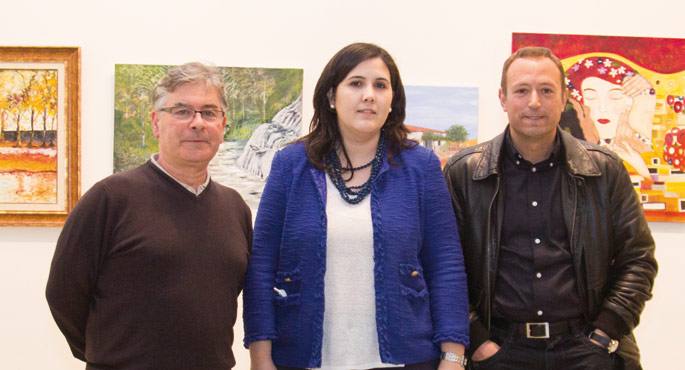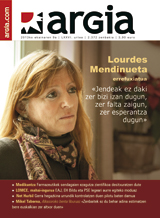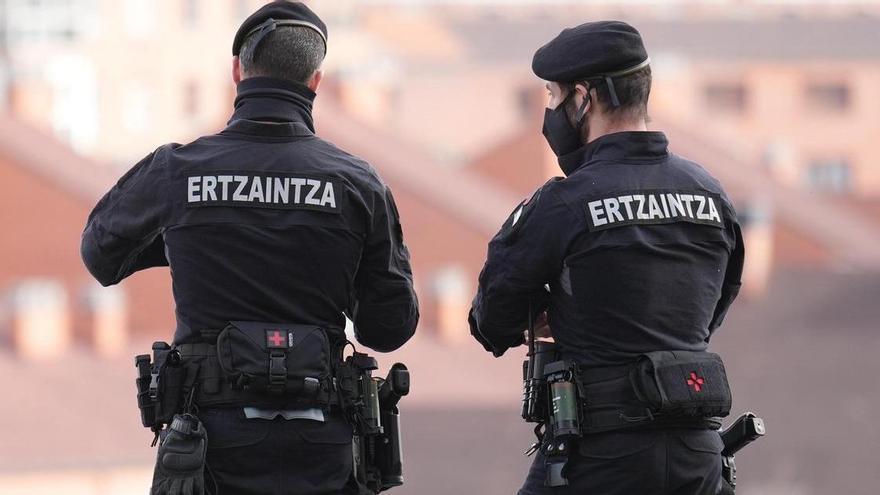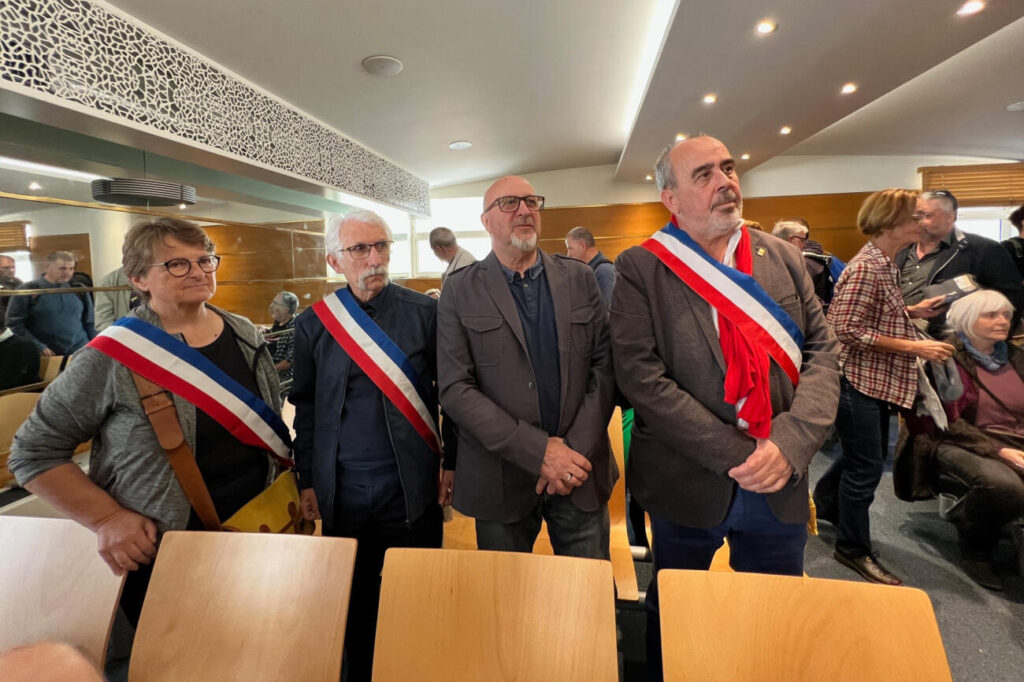Questions the consensus of the opposition or the way to plant oneself
- We have put in the debate the LOMCE (Organic Law for the Improvement of Educational Quality) or the Wert reform. At the round table organized by Maria eta Jose Ikastetxea de Zumaia, speakers Jone Berriozabal of the PNV, Juanjo Agirrezabala of EH Bildu and Juanma Aramendi of the PSE-EE, moderated by the author of this article, participated. Here's the summary.

We have invited the four main parties in the Basque Parliament to a round table on the LOMCE of the PP or the reform of the Wert. Have we received a no from the PP?
What should the Basque Government do to the LOMCE? Has the Minister of Education, Cristina Uriarte, taken any action?
Jone Berriozabal: The PNV, for its part, greatly disagrees with the draft of this bill, as announced by Cristina Uriarte when he took office. The Department of Education tried to maintain bilateral or peer negotiation, but the minister closed the door to this possibility, which is not ruled out. The Basque Government has pointed to Minister Wert's working team red lines that cannot be scratched at any time. The Basque Government, in addition to making political criticism, can hardly do anything at the moment. The PNV intends to make an amendment to the LOMCE as a whole, but we are all aware that pp has an absolute majority in the Spanish Courts. You can therefore reject the amendments to the whole tabled by us or by third parties. We will table partial amendments so that we can negotiate them as far as possible. If, at the end of the procedure, we see that the educational competences of the Basque Country are violated and that this bill detrimental to the Basque Educational System is approved – because what Wert has presented may not be accepted, but the amendments proposed by other groups are included – at that time the PNV will implement all the instruments of self-government defense, both political and, for example, constitutional.
Juanjo Agirrezabala: Councillor Cristina Uriarte said at the first meeting in Madrid that “we have to talk, I think we can reach agreements”. In other words, dialogue will be the way to turn this bill around. The attitude of the Basque Government has therefore been very timid. It has not led the situation, nor has this people, against LOMCE. For example, what the Government of Catalonia has done. We in this Community have missed it. It now appears that the Basque Government wants to work in a stronger position. Will it be true? Wert says that this bill will be passed for the course 2014. What is the Basque Government going to do? You, Jone, say that you are going to break the paths there are, but in spite of those paths, if the law is applied, will the government do so? Is the PNV ready to deal with LOMCE in its entirety? The situation is serious. We are all in Parliament against LOMCE. It is time for political and educational actors to agree. I hope that when you come to the Basque Parliament, you will have courage on the part of the PNV and the PSE, that you will abide by that law.
Your review, Aramendi.
Juanma Aramendi I agree with Juanjo...
J. Agirrezabala:. As if that were not enough, PNV and PSE have come together in Parliament...
J. Berriozabal: ...and you should explain why EH Bildu abstained when the Basque Parliament called for the withdrawal of the bill.
J. Agirrezabala: We were not against the withdrawal, we were in favour of all the measures. It's different. We wanted to sign a plane, that the LOMCE is not going to be implanted at all here.
J. Aramendi: Juanjo, you, like me, have been in the government for many years, and I do not know what it was planted in.
J. Berriozabal: That is it!
The path of disobedience, insufcision, planting... How far can the government go to deal with LOMCE?
J. Aramendi: Those of us who have been in government know how far the input is coming. It is time to seek consensus and act responsibly towards LOMCE. I, in part, agree with what Juanjo said about leadership. We were very surprised that Mrs. Uriarte said “we will see how far the negotiations go”. We say that this reform is a counter-reform, a retrograde law that brings a differentiating spirit. We don't want that school model either in Spain or in Euskal Herria, because it's going back to Francoist times. Isabel Celaá, the Minister of Education of the last legislature, asked for the resignation of Minister Wert when we were in the Government of Spain. We would like the current Education Counselor to have a different attitude and lead the fight against LOMCE together with the educational community, even if the community is not as united as Juanjo says. Meanwhile, the special measures that Rajoy introduced with regard to education, such as the teachers' schedules or replacements, are resorted to without being applied. Therefore, firm positions must be maintained, but the input cannot be gambled upon. There are limitations.
J. Berriozabal: On the issue of planting, a leader known in Gipuzkoa has just said that “a good ruler should not comply with unfair laws.” That is the message that Juanjo has brought to us, but the same ruler who said that phrase complies with many unfair laws in this country. I therefore do not think it is very serious to make this proposal, at least when we have not opened the other roads, this has only just begun. We've been working on drafts for many months now, analyzing, criticizing. The real time has come now. We will now have to see what we can do and, of course, do so with the greatest possible consensus. The measures of the Basque Government must be in defence of the self-government and the Basque Education System, with the greatest possible support from the educational agents. That is the way we have to work. The PNV has a direct relationship with the educational community, agents often come to the Basque Parliament. A joint declaration was opened in January with the signing of the agents. We have joined the manifesto and the decision taken in Parliament to challenge the law.
J. Agirrezabala: 99% of the educational agents agreed with the manifesto. It's a good example to respond to LOMCE. The educational agents ask the political parties to agree with the PP project. EH Bildu has shown his readiness to the Basque Government. If this takes steps to deal with it, we can find ourselves on the way. Disobedience, the plan or the path of insubordination are different, according to the concepts that are carried out gradually, but why can we not take into account and work the path of disobedience? That is what we do not see from this government, because if we are given a meal, we will have to eat everything after all. Is that to act responsibly? Eat from the dish that we don't want? Madrid will not turn back. The law will emerge in Congress over all the mobilizations, over and above what the State Council of Education itself says. Jone, make some amendments and say that you can change this or that, but the content, the basis, will not change. I say that the government has to lead the opposition against this, that is to say, to stand ahead from the very beginning and to reach the end. The PNV really likes to look at Gipuzkoa [a Jon]. I'm glad, because it's an example, because you have a lot to learn. The LOMCE is unfair, it is opposed to this people. The sovereignty of this people must therefore be upheld. We are a majority in Parliament. We are ready to explore the path of disobedience, if you are willing.
J. Aramendi: Sovereignty? All right. Someday, if this people is like EH Bildu, we will be on another stage, but today we have to play where we are and at the moment, with the legal order we have. That discourse can work if we're installed on that stage. For example, EA of EH Bildu, the Juanjo party, has ruled for years. Where were your approaches then? I believe that the speech has to go another way, taking into account the values of the heritage that this people has worked so far. In other words, under the same law, there has been no school failure in the Basque Country, among other things, because there has been consensus in this country.
One of the shortcomings of the Basque Educational System is the lack of a law of its own.
J. Aramendi: I would like to claim that we have a law of our own.
J. Agirrezabala: The laws we have are: The corresponding to the Basque Public School, approved in 1984, has not been renewed since then, and the Law of Standardization of the Basque Country. Nothing else.
J. Aramendi: But those have been the pillars to be able to take the steps that have been taken in education in recent years. Where was the Basque until those laws were implemented? What tour has the Basque made since then? How many professors then had Euskaldunized to develop teaching in Basque? 5% of teachers today are 90%. We have had these laws to move forward, and I claim them as the heritage of the Basque Country and the CAV. If we were in another scenario, we would be in a different situation, but today, with our political order and with the legislation we have, we have been able to build our own system. The results are witness. I would put the force here. Now, are we willing to develop our own educational system? OK. We are prepared to renew the legislation, but taking into account what we have done so far. Consensus will be the basis for the drafting of the law.
J. Agirrezabala: We do not give up being a law of our own. The law is an instrument. At the CAPV, we can make a law of our own. It is true that there is a dependency on Madrid, where the basic rules are laid down, which is the same in all the autonomous regions. We don't have the space we would like, clothed in our own law. We want sovereignty, to decide from there, that is our model. The Basque Educational System needs a definition of where we are going, and it is made by EH Bildu: democratic and Euskaldun. If we have a model, we have to define it more, and that's why we have to do the law. Indeed, the Basque Public School has been in operation since 1993, many decrees and standards have been developed. I agree with what Juanma said, the results here are not like those of the State, there are different indicators: Data from Children's Schools, ESO and University have nothing to do with those from Spain. School failure here is 12% and in the state it is 26%. In Europe, the average is 10%. Development has therefore yielded good results, but there are many deficits, and we propose to develop a separate Basque education law for the future. For us, law is not an end, but an instrument.
J. Berriozabal: I agree with Juanma, the education system has been effective because we have had a consensus. This is undeniable in the educational and linguistic field, the results are essential to reach the situation in which we have arrived. Therefore, the agreement that we have reached cannot be less than the consensus that has been reached so far, it cannot have less support. On the other hand, like Euskaltzale and Abertzale, I agree with Juanjo that it is an Euskaldun and popular school, but it also has to be a multilingual and modern school. We have begun to go down that road, we must continue to do so.
Is one of our shortcomings to have a law of its own? Yes. Here too, I agree with Juanjo, saying that law is an instrument. But we often mix tools and objectives. Before the tools are put in place, we need to define the objectives well among all. At the moment we will have to complete the necessary instrument, law or regulation, provided that it is maintained by consensus, and not for the next government to arrive and be amended, as has happened with LOMCE.
“For the Basque Government, Wert’s attack is strategically beating. If it does nothing but attack that, the government will be very comfortable.” This has been said by the president of the Ikastolas Federation, Koldo Tellitu.
J. Berriozabal: I do not understand what it means. Suspicions are unfounded. I do not think it is responsible for such statements being made on behalf of an association of thousands of people. Many of them disagree with what that person has said. It would be a betrayal if we proposed the law of Minister Wert or were prepared to accept the unilateral debate or between different.
J. Agirrezabala: What Tellitu says is that, if you do not take an active attitude, the situation can be comfortable for you: “He has come to us from Wert, and we can do no more than fill him.” That is what I understand. Basically, he says that the government should lead a position contrary to Wert’s law. In any case, Jone, you said that you would apply other characteristics to Education. I see a lack of courage in the PNV. You spoke of multilingualism, the socialist party of three plurilinguisms, the pp of three in Spanish, UPyD says that the Basque country has no priority in this system. And we say that the Basque Educational System has to make multilingual Euskaldunes.
J. Berriozabal: Okay, so ...
J. Agirrezabala: Well, I told you and the Minister of Education in Parliament, to see if you were willing to implement what you say in the gallery. You say, yes, you say, you have also written in the programme, that the Basque country is going to be the axis. But are you willing to take steps? If you are ready, you will find us on the way. It can be a meeting point or a support point for the Basque education system to start working. Juanma, if it is true what Mrs. Celaá says, “that the Basque is the centrality of the system”, he agrees. In principle, I must believe it, but as far as I can. I told him that in the case of trilingualism, why does it not set at least 60% in favour of the Basque country? He did not answer. At least, you have said that the Basque country must be the axis. When we talk about Euskera, the results are clear, undeniable, many improvements have been made, both in the passing of 5% to 90% of the teachers and in the results of the students. But it is also clear that Euskera has important challenges. We have to put Euskera at the centre of education, no doubt. We first want multilingual Euskaldunes, who know Spanish, English and why not French.
J. Aramendi: When we've been in government, we've done that, not just believe. We have started to work on that journey and we have put the issue on the table. No taxation. We have acted experimentally to get trilingualism going, we have come to an agreement with the educational community. These are the steps that need to be taken. The challenge is to place school in the 21st century. The school as a whole, the Basque Country as well, is one of our sections and heritage, but like that, technologies, coexistence... We must know and work on the history of this people. Coexistence agreements are already there, transferring victims to schools. We must evaluate and concretize the advances that have occurred along the path of School 2.0. We have to come to an agreement. The agreement has to be from the bottom to the top and make a joint journey. Hopefully we found ourselves on that path! We must promote this new type of school among all.
J. Berriozabal: How can we not agree to create multilingual Euskaldunes? Everyone agrees with that. Don't put that face [to Juanjo]. Multilingual Euskera brings only wealth to the individual and to society. Now the challenge is for all students to improve language proficiency, not only in English, but also in the two official languages, in Basque and Spanish. Euskera is a basic pillar in our system. EH Bildu intends to generalize the system that has as its axis the Basque, but we are all aware that the model D that has as its axis the Basque Country perfectly in Zumaia, because the environment offers a unique opportunity. But model D, which has as its axis the Basque country, does not have the same influence in another area. Therefore, we have the challenge that all students speak better in the third or fourth language, and in the first place, of course, students from all over the Basque Country should speak better in Basque. In order to do this, we have to put forward other initiatives outside school and around school. The school can give a lot, but sometimes it can't give everything. The rest of the spaces in which the classes are most taught will also have to collaborate. The environment is very helpful, not only in terms of language but also in terms of education. The hours from Monday to Friday are the same, having to work outside of them.
LOMCEk ez du hezkuntza sistema eta kalitatea hobetzen. Lehen akatsa hauxe da: gobernu aldaketa dagoen bakoitzean, hezkuntza legeak aldatzen dira, eta gobernu edota alderdi bakoitza bere arrastoa jartzen saiatzen da. Ondorioz, hezkuntza arloko araudiaren jarraikortasuna eta egonkortasun falta dira ikastetxeetan. Bigarrena: eskola porrotari dagokionean, datuak makilatu nahi ditu, Espainiako Estatuaren datuak Europar Batasunekoetara hurbilduz. Euskal Hezkuntza Sistemaren eta Europako sistemaren tasak hurbil daude, ez ordea Espainiakoak. Ahalegin hori egiten ari dira lege proiektu horren bidez, halaber, Estatuko autonomia erkidegoetan dauden eskumenak eta ezaugarri propioak urratu egiten ditu. Uniformatzeko eta zentralizatzeko begi-bistako nahia dago. EAJ aurka dago, LOMCEk ez duelako Gernikako Estatutuak ematen digun eskumen esklusiboa errespetatzen. Euskadik hezkuntza araudien eskumen esklusiboa du, eta lege egitasmo horrek erabat ukatzen ditu gure eskumenak. Oinarrian ez dago inongo azterketa zientifikorik edo teorikorik, inork ez daki zertan oinarritu den ministroa proposamen hau egiteko. Azkenik, honetan denok ados gaude, proposamenak ez duela adostasun sozial eta politikorik, kontrakoa. Gizartea batu egin da egitasmoaren kontra, ez alde.
Werten egitasmoak kutsu ideologikoa dauka. Espainiako Gobernuak ezarri dituen murrizketekin bat egiteaz gain, inboluzioa dakar, eskolaren birzentralizatzea eta uniformatzea. Atzerapauso handia da, euskal herritarron hezkuntzaren eta hizkuntzaren aurkako erasoa. Euskal Herriak burujabetza osoa behar du hezkuntza arloan, euskal jendartearen araberako berezko erabakiak hartu ahal izateko. LOMCE Wert-en “ordenu eta agindu” delakoaren araberako egitasmoa da. Wertek ez duela sekula negoziatuko dio, legea “bai ala bai” onartuko dela. Beraz, ez du kontsentsurik nahi, hezkuntza komunitatearekin ez du ere hitz egin; PPren ideologiaren araberako legea izango da. Espainia gehiago planteatzen du, espainiar curriculumari begirako planteamendua da: EAEk %55aren eskumena dauka orain, aurrerantzean aldiz, Espainiako Gobernuak %60an finkatuko luke zeregina. Azterketak berak egingo ditu, curriculumaren ehuneko ehuna finkatuko du. Geure curriculuma finkatzeko aukerarik ez dugu izango. Ondorioz, euskal curriculumik ez eta euskara are murritzagoa. Euskara ez bigarren mailakoa, baizik eta hirugarren mailakoa izango da. Erlijioa ere gehiago. Euskal Hezkuntza Sistema gutxiagotu nahi du. Aginduak Madrilek eman eta Jaurlaritza delegazio bat izatea nahi du. Euskal Herria gutxiago izatea planteatzen du funtsean.
LOMCE irakurrita ematen du Francoren garaitik hona ez dela pausorik eman. Beraz, azken hamarkadatan irakaskuntzan eman diren aurrerapausoak baloratuta, nire ikuspegia oso ezkorra da. Estatuko erkidego autonomoetan lege berberarekin emaitzak ezberdinak dira. Egun, eskola porrotaz hitz egitean, Estatuko porrotak eta EAEko porrotak ez dute zer ikusirik. Datuek ez dute parekorik eta legea bera da. Alderdi sozialistak oso garbi dauka, lege egitasmo horrek inboluzioa eta kontrarreforma eragin nahi ditu, ez da erreforma bat egitea. Wert-ek kontsentsuaren beharra aipatzen zuen iraganean, gaur egun, zeuden kontsentsuak apurtu nahi ditu eta horiez gain lege proiektu hori atera dute, eskola porrotaren aitzakian eratu dute beren proiektua, eta lege horren bidez eskola merkea egin nahi ote duen nago. PSOEko ministro ohi Gabilondok esan zuenez, hezkuntzan inbertitzea oso garestia da, baina pentsa dezagun zein garestia den ez inbertitzea. Zer etekin aterako dugu, hezkuntzan inbertitu gabe? Krisia eta ekonomia arazoak ditugu, baina ez badugu inbertsioa sustatzen hezkuntza sisteman oker goaz. Kontrarreforma hau hor kokatzen da. Alderdi sozialistaren iritziz, LOMCEk PPren eta Espainiako alderdi kontserbadoreen eragina jaso du, hiritartasunaren aurka doa, urtetan landu den espirituaren aurka.
On the Internet comes the title of a movie that I still saw when I was growing up looking for the word Willow. In this fantasy film, the protagonist, a small man named Willow, transformed the world by liberating its inhabitants from an oppressive kingdom. Google just launched a... [+]
Araia told me to write to you. He told me that before I leave them (I will do this this year), they want to take you a text of mine, which I have never taken you, and that you deserve, that you will be proud of me. Such an opportunity cannot be missed. I don't know what I can... [+]
I have recently had the opportunity to see the latest work by Pierre Carles, a committed documentary author. Under the name of Guérilla des FARC, l'avenir a une histoire (FARC guerrilla, the future has history), proposes a renewed account of the armed conflict that has lasted... [+]
The poor management of the Valencian cold drop has led to a change in adverse meteorological alerts, as shown in the first season of "winter". Faced with the threat of rivers overflowing in Hego Euskal Herria, the indications for protection came along several paths, since no... [+]
We're in chaos. That has been said to us by the French media, which Parliament has brought down the government on 4 December. The fear that political, institutional, social, economic chaos will rage us all in the horde of hell comes to our veins. What comedy we're going to play... [+]
In 2011, the powerful 15-M movement broke out, which put the Catalan Govern in a hurry. Among other things, on that occasion the Police ran into the indignant camp of the Plaza Cataluña de Barcelona and besieged the Parlament on the day that the activists had to approve the... [+]
























